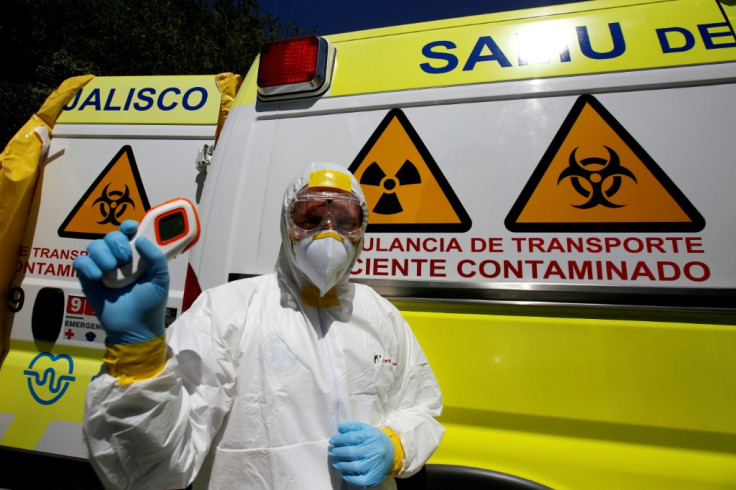Asia tracks Wall Street surge on hopes for policy response to virus
The positive sentiment filtered through to oil markets, where dealers are betting on major producers cutting output to address tumbling demand.
Asian traders pushed equities higher for a second day Tuesday following a blockbuster surge on Wall Street fuelled by hopes for a concerted global response to the coronavirus.
Pledges to action from central banks around the world and a planned conference call between Group of Seven financial chiefs provided a much-needed boost to markets after last week's hammering.
The positive sentiment filtered through to oil markets, where dealers are betting on major producers cutting output to address tumbling demand.
However, while authorities look to draw up battle plans, the disease continues to spread to new countries and claim more lives, with the US toll jumping and the head of the World Health Organization warning the world was in "uncharted territory".
The virus has now killed more 3,100 people and infected more than 91,000, though China -- where it started -- reported Tuesday its fewest new cases in six weeks.
In early trade, Shanghai was up 1.2 percent and Sydney surged 1.7 percent while Hong Kong added 0.4 percent and Seoul put on 1.3 percent.
Tokyo rose 0.1 percent by the break, while Manila, Taipei and Jakarta all added more than one percent. Wellington climbed more than two percent.
The rally came a day after Wall Street enjoyed its best day in more than a year as the Dow soared more than five percent, while the S&P 500 and Nasdaq piled on around 4.5 percent -- taking a chunk of losses of more than 10 percent last week.
After last week's rout, investors returned to buying as central banks from major economies including the US, Japan and Europe said they were ready to provide support with monetary easing such as interest rate cuts and cash injections to financial markets.
The US Treasury also announced that Secretary Steven Mnuchin and Federal Reserve chief Jerome Powell will lead a conference call with their G7 counterparts later Tuesday on how to respond to the virus.
"While it would be easy to deride news of a conference call, it is a good sign of potential action to come and should bring some stability to markets," said AxiCorp's Stephen Innes.
"And it would suggest we're moving beyond verbal intervention, as global policymakers want to get in front of the virus's economic carnage through the framework of policy action."
He added that central banks had the power to stop massive sell-offs such as last week's but "the policy shock and awe impulse needs to be delivered quickly to have the highest market impact".
Still, National Australia Bank analyst Ray Attrill warned about how far such action could help during this crisis.
"An impending round of fresh central bank easing is not going to make COVID-19 go away," he said in a note.
"Indeed the more draconian and successful efforts at containing the spread of the virus are worldwide, the bigger will be the negative economic consequences. But this thought is playing second fiddle so far this week to the prospect of yet more central bank largesse."

The outbreak has already impacted economies, with an index of Chinese factory activity falling to a record low last month, while a US survey of manufacturers came in below forecast, with expectations of worse to come.
And the OECD said global economic growth could come in at its slowest rate since the financial crisis.
However, with demand for crude tipped to take a battering -- particularly in crucial consumer China -- OPEC will hold an extraordinary meeting Thursday with other producers led by Russia to weigh its response.
Hopes for an output cut sent crude prices soaring Monday, and both contracts extended gains in Asia by rising more than three percent.
"The air is rife with expectations that G7 finance ministers and central bankers will move to prop up financial markets and that OPEC will tighten the reins on supplies in response to the virus-driven demand shock," Innes added.
Tokyo - Nikkei 225: UP 0.1 percent at 21,355.20 (break)
Hong Kong - Hang Seng: UP 0.4 percent at 28,389.93
Shanghai - Composite: UP 1.2 percent at 3,007.46
Dollar/yen: DOWN at 108.15 yen from 108.25 yen at 2300 GMT
Euro/dollar: DOWN at $1.1125 from $1.1143
Pound/dollar: DOWN at $1.2760 from $1.2762
Euro/pound: DOWN at 87.18 pence from 87.30 pence
Brent Crude: UP 3.1 percent at $53.50 per barrel
West Texas Intermediate: UP 3.5 percent at $48.37
New York - Dow: UP 5.1 percent to 26,703.32 (close)
London - FTSE 100: UP 1.1 percent at 6,654.89 (close)
Copyright AFP. All rights reserved.
This article is copyrighted by International Business Times, the business news leader




















